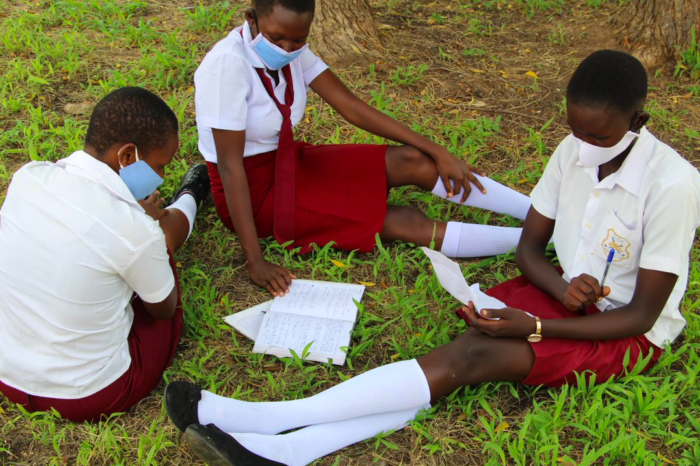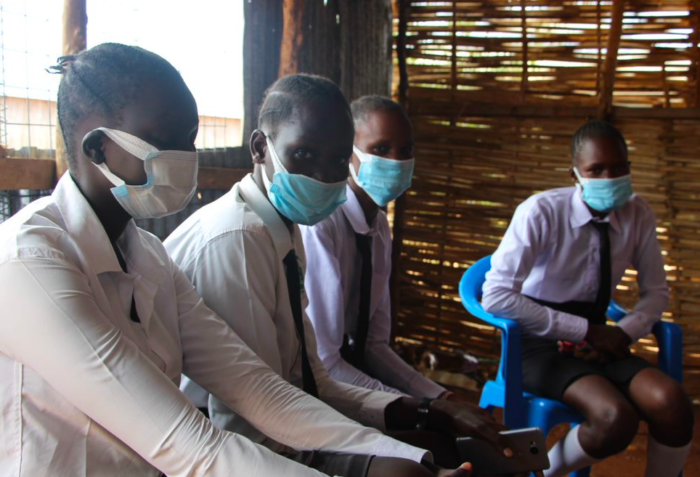National Girls’ Education Day sheds light: More needs to be done for South Sudanese girls
July 7, 2021 10:35 amToday is National Girls’ Education Day in South Sudan. This year’s theme – ‘Creating a safe and conducive learning environment for girls during COVID-19 and beyond’ – is a response to the alarming number of reported cases of early and unintended pregnancy and early marriage during the COVID-19-related school closures.
Girls across South Sudan consider school as a safe place; a place where they can meet their peers; a place where they can remain hopeful; a place where they are safe from the practices of forced and early marriage. The COVID-19 related school closures removed this safe space and led to an increased risk of early and unintended pregnancy (EUP) and forced marriage.

Research conducted by Girls’ Education South Sudan (GESS) and the Ministry of General Education and Instruction (MoGEI) in October 2020 showed that over 4,800 learners in 2,404 schools across the country were pregnant at the time of the research. This is 0.4% of all of the female enrolled learners, although some schools were not reachable during the research phase.
In response, MoGEI issued a circular in January 2021 to ensure schools allow pregnant and nursing learners in candidate classes (Senior 4 and Primary 8) to sit their final exams. However, there is still a lot that needs to be done to challenge the negative societal norms and views about a girls’ education.
Akuja de Garang, GESS Team Leader, said that “the struggle to realise gender parity in schools is never ending, girls need to feel safe both at home and in school. On a day like the National Girls’ Education Day, we are reminded of what has been achieved and what more needs to be done for the South Sudanese girl child to have a better future. An educated girl is a resource for nation building”.
Nyaruot’s Story
Nyaruot is a 19-year-old Senior 3 student. She is studying sciences in the hope of becoming a nurse. She lives with her parents in the Protection of Civilian (PoC) site in Juba which is home to 235,000 internally displaced persons (IDPs) out of a total 1.62 million IDPs in South Sudan (OCHA, 2021).
Nyaruot is one of many girls who is facing compounding challenges in the face of COVID-19. Due to school closures, students have been forced to stay at home for over a year. The effects of this time are untold, but we are starting to understand the magnitude.
When schools were closed due to the pandemic, Nyaruot and her elder sister had to stay at home. “There was nothing we could do, no way to learn, nothing to keep us busy and life became really boring. We didn’t know how long we were going to stay at home and we were worried about not being able to get to school again”, Nyaruot says. She says that could be the reason her sister got pregnant. “I think she thought she was becoming too old (21 years old). She got pregnant but she still lives with us. Her husband can’t even take care of her”.
Some girls feel that they are too old to be in their current classes. Marriage is more alluring when girls are at home feeling helpless and pressured by societal norms. “You know, when I came back to school, I was feeling like I am now too old to be in Senior 2 and I feel bad about it. If I could do anything, I would go to Senior 4”, said Nyajima, a Senior 2 student at Nyaruot’s school in the Juba PoC.
Nyaruot spoke to us about the pressure that she has experienced from family members. “At least when we speak to the teachers, they can support us, but usually it is the parents that make the decision for us to either be in school or not. If you don’t have a father, it is even more difficult because some of the relatives will take advantage to force you into marriage”, she said. One of Nyaruot’s classmates added, “When we are in school, we feel good but when we go to the community and take off our uniforms, we are always told we are old enough to get married”.
Nyaruot is positive that someday she will be a nurse and she will be able to support people in her community. “I don’t care about what people are saying now. I will work towards achieving my goal and be useful in my community as a nurse”.

Schoolgirls from the Juba POC
What support is available to pregnant and nursing learners and those at risk of EUP?
As well as the landmark circular issued by MoGEI earlier this year, GESS, funded by UK aid from the UK government and the government of Canada through Global Affairs Canada, continues to support girls across the country, supporting girls like Nyaruot to complete their education.
The work of GESS’ Gender, Equity, Social Inclusion (GESI) and Mentoring Assistants, has focused on identifying pregnant and nursing learners who were told, either by family or school management, that they were not allowed to sit their examinations and finish their education. The GESI & Mentoring Assistants have been tracing girls who didn’t return to schools when they reopened. They have been making home visits to encourage girls to finish their education despite the challenges.
In this video, we spoke to the GESI & Mentoring Assistant and the young mothers she has been supporting in Bor, South Sudan, about their fight to remain in school.
GESS’ behaviour change content, including radio programmes and family listening groups, has kept children and parents engaged in education related matters whilst schools were closed. The aim is to develop a positive social-cultural environment for supporting girls’ education in South Sudan. Radio programme topics have included ‘How to keep your children engaged during school closures’ and ‘Enrolling Breastfeeding and Pregnant Learners back to school’.
In 2020, GESS paid 413,532 Cash Transfers in 2020 round one and 401,338 in 2020 round two to girls across South Sudan, even while they were not in school. These unconditional payments aimed to mitigate the risks associated with extended school closures and the economic downturn brought about by COVID-19, and to incentivise girls to re-enrol when schools reopened.
As you celebrate the National Girls’ Education Day, it is important to note that you can play a role to ensure that girls continue to learn in safe environments. Parents, teachers, school management, communities and religious leaders, as well as all other stakeholders, are called upon to support girls to finish their education before becoming wives and mothers.
To the learners: if you feel unsafe, speak to someone you trust!
To report any cases in which pregnant or nursing learners have been denied their right to education, or to sit their examinations, please call the free hotline number ‘623’ (South Sudan only)
Categorised in: GESS Events, Girls' Education, Human Interest Story